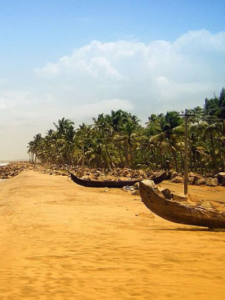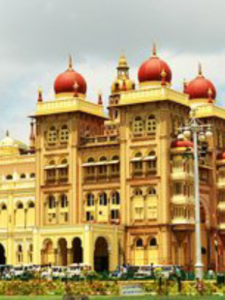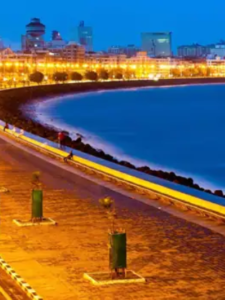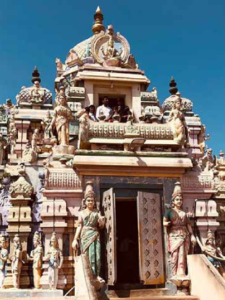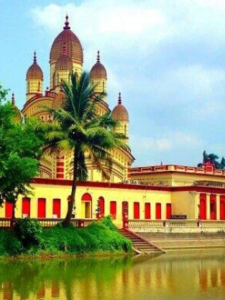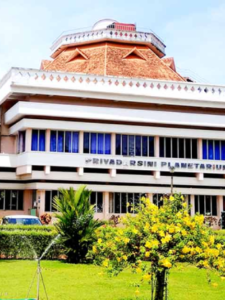Laterites are infamous for not allowing a single blade of grass to grow on it. Konkan, Maharashtra has a sizable area under laterites due to exposure of red soils over time to convert it into a chunk as hard as rock. These areas locally known as jambha katal are usually kept fallow. However, some of these areas have profitably been utilized for alphonso mango cultivation using the techniques of Dr. Balasaheb Sawant Konkan Krishi Vidyapeeth (DBSKKV), Dapoli, Maharashtra, using the wisdom of local farmers. This results in two-fold benefits namely, expansion of cultivable area in alphonso mango and profitable use of otherwise fallow lands. The present article details the technique of hard rock alphonso mango planting in Konkan, Maharashtra. Using basic and fundamental data on natural resources, it also explores the mystery behind the successful endeavour for profitable and economically feasible alphonso mango cultivation on otherwise wastelands.
Introduction Spatially-associated red (Alfisols) and black soils as distinct entities are common in the Western Ghats and in Konkan, Maharashtra. These soils are often referred to as laterites. The terms ‘red’ and ‘laterite’ have led to controversial opinions. Contrary to general belief that such soils are difficult on which to grow crops, these associated soils in Konkan are cultivated profitably to various agricultural and horticultural crops besides forestry with appropriate conservation measures. Out of many horticultural crops, Alphonso variety of mango is one of the most popular and preferred crop for planting in Konkan, Maharashtra grown on many occasions on these associated soils often referred as laterites.
Area of the Study As compared to other parts of Maharashtra and also from India in terms of variation in geology, climate, soils, and environment, Konkan, Maharashtra is different. Konkan covers an area of nearly 3.0 million hectares (Mha) and represents a coast line of 720 km stretching south of Gujarat to north of Goa. This basaltic terrain receives a rainfall averaging 2500-4000 mm. North Konkan comprising of part of Raigad, Thane and Palghar , bears some similarity of typical basaltic landscape like central Maharashtra and Vidarbha. This might be due to the fact that Palghar and Thane are on lower elevation and have more breadth (distance between Arabian sea and the Western Ghats) resulting in the formation and persistence of deep black soils as is common in other parts of Maharashtra. On the contrary, southern Konkan gradually narrows down south to Goa and represents undulating landscape with steep slopes causing severe soil erosion and at many places typical landscape commonly known as laterites or locally as jambha katal (hard rock). Out of 49% agricultural land in Konkan, Maharashtra, 72% is a land under crops while the rest is fallow.
Alphonso mango in Konkan, Maharashtra Alphonso mango is a tropical fruit, but can be grown up to 1100 m above mean sea level. The ideal temperature range for appropriate alphonso mango growth is between 24 to 32 Degree C. It can be grown best in regions with a rainfall of 2500 mm (250 cm). High humidity, and rain or frost during flowering are detrimental to alphonso mango cultivation. Higher temperature during fruit development and maturity gives better quality fruits. Regions with bright sunny days and moderate humidity during flowering and fruit development are ideal for growing alphonso mango. Alphonso mango is an important rainfed perennial fruit crop of Konkan, Maharashtra. Various programmes implemented by Maharashtra Government since 1990 helped to speed up the plantation of Alphonso variety of alphonso mango; as a result, the area under alphonso mango cultivation increased up to 1,64,000 ha in Konkan region. Out of this 1 lakh hectare area is productive and contributes 2 lakh tonnes (t) of fruits production . The average productivity of alphonso mango is 2 T PER 1 Hectar which is much lower than that of the state (5.0 t ha-1) and national average (8.5 t ha-1). One of the main reasons for low productivity of alphonso mango from Konkan region is that the orchards are normally neglected because of most of the owners being absentee land lords. There are several progressive alphonso mango growers in the region who have been harvesting more than 7.0 t ha-1 of alphonso mango. Land Availability and Hard Rock Alphonso mango Cultivation Availability of productive land in Konkan is the major limitation for many people to go in for Alphonso plantation. Though cultivable waste land suitable for alphonso mango plantation in Konkan region is available, it is mostly owned by many members of the family and most of them are absentee land lords. Therefore, such fragmented properties (land) remain fallow. In Konkan the land available near Sahyadri hills and away from the sea shore around 20 km are not suitable for alphonso mango plantation due to late flowering and subsequent late harvesting. So the availability of land for new plantation is a major problem. Even if some small holdings are available, those cannot be brought under cultivation due to family disputes. All these factors force the new entrepreneurs to go in for hard rock (laterites) plantation. The lateritic hard rock areas are nearby sea-coast and some of these pockets are directly exposed to the sea which favours very early flowering and development of excellent quality fruits to fetch premium market rates. Moreover, the quality of alphonso mango grown in lateritic rock is also good. There are other reasons also for embracing the hard rock alphonso mango cultivation practice. With the horticultural revolution in Konkan region post 1990, all the suitable land for alphonso mango with specified depth was occupied immediately. This prompted some farmers to explore the possibility of planting alphonso mango on hard-rock by adopting the technique to make these hard surfaces suitable for alphonso mango cultivation. Their age-old observations of early flowering and production of good quality alphonso mangoes of Alphonso trees planted in the natural cracks on rocky areas helped them to enter into this novel technique. Advanced mechanization of drilling, blasting and excavation of pits in hard rocks played an important role in the spread of this approach. Rough estimates indicate that nearly 3 lakh hectares of such hard rock area is fallow in Konkan, Maharashtra. Some success stories indicate that Alphonso trees grown on such type of land bear fruits early which are sold at a premium price in metros and abroad due to its characteristic taste and colour. These areas have been reported to be in Sindhudurg district (about 30% of total area in Vengurle, Malvan and Deogad tehsils) and Ratnagiri district (10-15% of total area in Rajapur, Lanja, Ratnagiri, Guhagar, Dapoli and Mandangad tehsils). The technique for layout and blasting for fracturing the rocky layer is widely used now throughout the Konkan. As the excavated material from the rocky areas after blasting is not suitable for alphonso mango trees, non-native good quality poyta (soft) soil from the adjoining areas is procured for filling the pits at the rate of approximately 1 brass per pit. The excavated material is used in situ for preparing a raised mound around the individual plant. Nearly 20 to 25 thousand hectares of alphonso mango orchards have been raised in south Konkan in a 10 km wide strip along the coast starting from Mochemad in Vengurle (South Konkan) to Dabhol in Dapoli (Central Konkan) using this technique. There are mixed experiences of the farmers in terms of failure and success of hard rock alphonso mango cultivation. The success of this technology mainly depends on (i) type of rock (continuous hard, semi-hard or soft rock determining root penetration and water drainage), (ii) generation of cracks in the side-walls and bottom of the pit facilitating root spread, (iii) dimensions of the pit to occupy at least 75-100 cubic feet of soil, (iv) quantum and quality of soil used for refilling the pits, and (v) time and intensity of canopy management as per the planting density adopted. It has also been known that during blasting operations, the cracks in the underlying hard pan are not appropriate for easy penetration of water, and the trees may fail to survive to produce optimum yield. The reports have been made about death of trees if inappropriately planted in these areas due to severe heat in pit as high as 50 oC in the parts of the Western Ghats. This is in sharp contrast to the basic understanding that soil temperature in summer is always less than the above mean temperature in the tropics. In most of the cases these observations are based on conjectures.



